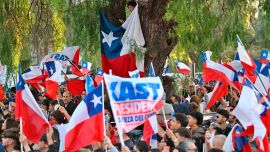Without Uruguay's support, Argentina, Brazil and Paraguay pledged Friday to "continue the modernisation" of the Mercosur trade bloc and to advance in a review of its common external tariff (CET), according to a communiqué issued at the close of a virtual summit on Friday.
In a statement issued after a two-hour meeting, the three countries "committed to continue the modernisation of Mercosur by strengthening free-trade and regulatory convergence and harmonisation within the bloc.”
Argentina, Brazil and Paraguay also agreed to a "review of the [bloc’s] Common External Tariff" that taxes goods imported into Mercosur, "as a primary instrument for the strengthening of the customs union."
Uruguay, which opposes the tariff review agreed by Argentina and Brazil in October, did not sign the communiqué, a source from the Brazilian Foreign Ministry confirmed to the AFP news agency.
Montevideo is making its support for a cut in tariffs conditional on the liberalisation of rules blocking bilateral negotiations with third countries.
President Luis Lacalle Pou wants to progress talks over a free-trade agreement with China. Back in September, he announced that negotiations with Beijing had begun, ignoring a ban imposed in 2000 on talks with third parties without the agreement of the bloc’s other members.
At Friday's meeting, the president stressed that Uruguay "will insist in the times to come" that the bloc continue "opening up to the world."
"We have to reach a middle ground so that all participants in the bloc feel satisfied," he said.
After failing to reach a consensus on lowering the common external tariff, the Brazilian government announced in early November that it would unilaterally reduce import tariffs by 10 percent as a measure to contain inflation.
"It was an exceptional and temporary move," Bolsonaro said at the summit, referring to the measure, which will be in force until 2023.
The Brazilian leader began the host by “regretting” that all parties had not been able to reach an agreement on the CET, given the “willingness to accept a lower reduction than we initially planned.”
Paraguay President Mario Abdo Benitez said his country will prioritise the tariff review process, on which members have achieved "a significant rapprochement of positions in recent months.
Argentina’s President Alberto Fernández was more open to changes than on previous occasions, though he made no explicit concessions: "The opportunity for a successful review of our tariffs should not be wasted," he said, calling for "in-depth discussions."
Tensions
The summit, which was originally meant to take face-to-face in Brasilia, was taken online without the Brazilian government outlining its reasons.
Local press speculated that the decision was a response by Bolsonaro’s government to events in Buenos Aires last week, when former leftist president Luiz Inácio Lula da Silva (2003-2010) – the president’s likely opponent in the next election – attended an event celebrating democracy in the Plaza de Mayo with President Fernández and Vice-President Cristina Fernández de Kirchner, a longtime foe of Brazil’s far-right leader.
Ties between Argentina and Brazil have been strained since Fernández took office in December 2019, with Bolsonaro a declared critic of Kirchnerism and Peronism.
While trying to overcome their differences, the Mercosur bloc also has the pending issue of its free-trade agreement with the European Union, concluded in 2019 after decades of negotiations, but which has yet to be ratified by several European countries such as France and Germany, where it is now being resisted.
Mercosur has more than 300 million inhabitants and cumulatively is the world's fifth-largest economy, according to the International Monetary Fund (IMF).
– TIMES/AFP























Comments